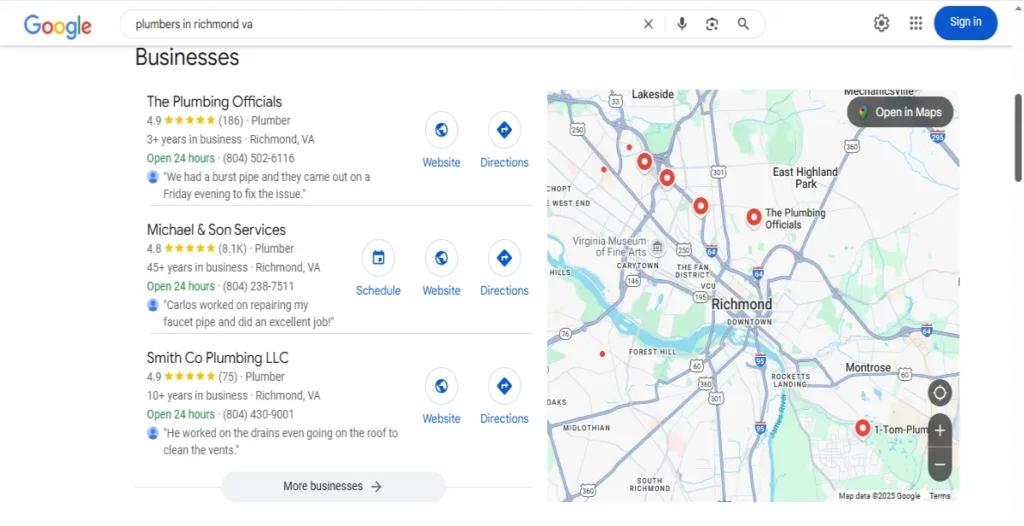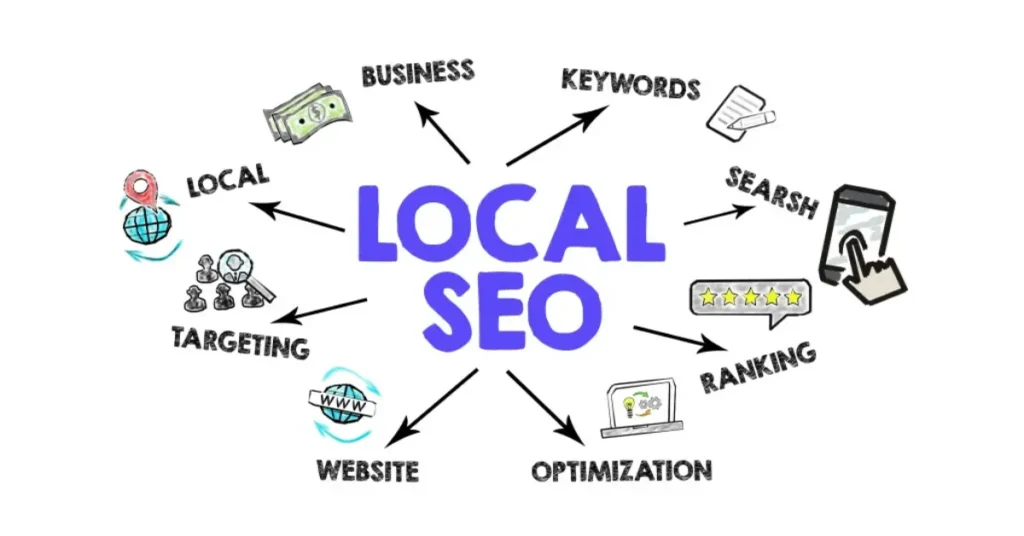Key Takeaways:
- Local link building boosts your local search rankings.
- Relevant, authoritative local links build trust.
- Consistent NAP data across directories is vital.
- Engage with local groups and media for links.
- Create local content that earns backlinks.
- Mobile optimization enhances link potential.
- Ethical outreach builds lasting relationships.
- Monitor your link-building progress.
Unlock Local Dominance: Your Guide to Local Link Building in the US for 2025
Link Building For Local SEO is essential for business owners in the United States who want to attract local customers—your neighbors, your community. But how do you connect with them online? Local SEO holds the key.
It helps your business appear when locals search for what you offer. A key part of local SEO is link building. Think of links as votes of confidence from other websites.
When local sites link to you, it tells Google your business is a trusted part of the community. This article shows you how to build these valuable local connections.
The Moz article on local search ranking factors emphasizes the various elements that influence how local businesses rank in search engine results. Here’s a summary of the key aspects:
Key Types of Local Search Ranking Factors:
- Google Business Profile (GBP) Factors: Optimizing your GBP is crucial. Key elements include:
- Business Title: Including relevant keywords in your business name can help.
- Categories: Selecting accurate and specific categories (you can choose up to ten) is vital for relevance. The primary category carries the most weight.
- Website URL: Linking to a strong and authoritative website page from your GBP can boost rankings.
- Other important GBP factors include completeness and accuracy of information, usage of features like Posts and Q&A, and photos.
- Review Factors: The quantity, recency, velocity (how frequently new reviews are received), diversity (presence on multiple platforms), and sentiment of your online reviews significantly impact rankings. Responding to reviews is also important.
- Citation Factors: Online mentions of your business’s NAP (Name, Address, Phone Number) are crucial. This includes both:
- Structured Citations: Formal listings on platforms like Yelp, Yellow Pages, and industry-specific directories.
- Unstructured Citations: Mentions in blog posts, articles, and other web content.
- Accuracy, distribution, quality, and relevance of these citations are key.
- Link Factors: Similar to organic SEO, both internal (links within your website) and inbound (links from other websites) are important. Focus on acquiring links that are topically and locally relevant and come from authoritative domains.
- On-Page Factors: Optimizing your website for local search is essential. This includes:
- NAP Consistency: Ensuring your name, address, and phone number are prominently displayed on your website and match your GBP and citations.
- Keywords in Titles: Using relevant keywords in your website’s page titles.
- Domain Authority: A website with a higher domain authority is more likely to rank well.
- Technical aspects like mobile-friendliness, security (HTTPS), proper rendering, and absence of malware are also important.
- Behavioral Factors: Google considers real-world signals of user engagement with your business, such as:
- Branded searches (how many people search for your business name).
- Click-through rate (CTR) from search results.
- Clicks to call from your listing.
- Driving directions requests.
- Website engagement metrics (time on site, bounce rate).
- Foot traffic to your physical location (if applicable).
- Personalization Factors: A searcher’s location, search history, and social connections can influence the local results they see.
- Negative Factors: Spammy or inaccurate listings, negative reviews, and penalties can harm your local rankings.
Overall Importance:
The relative importance of these factors can shift over time as search engine algorithms evolve. However, consistently optimizing across these areas provides a strong foundation for improved local search visibility.
Google increasingly aims to provide answers directly within the search results (zero-click searches), making a strong presence on your GBP and other local platforms even more critical.
In recent years, the Google Business Profile has become an increasingly significant ranking factor, emphasizing the importance of a fully optimized and actively managed profile.
Reviews also continue to grow in importance, reflecting the trust and social proof they provide to potential customers.
While citations’ direct ranking influence might have decreased slightly, their overall value in establishing trust and providing consistent business information remains important.
Understanding Local Links: More Than Just Backlinks
What links “local”? It comes from a website relevant to your service area. This could be a local directory, a community blog, or another local business.
The Google Search Central documentation on making links crawlable emphasizes the following key points:
- Use
<a>tags withhrefattributes: Googlebot can only discover URLs through standard HTML anchor tags (<a>) that have a validhrefattribute specifying the link’s destination. - Ensure URLs in
hrefare valid: The URLs within thehrefan attribute should be correctly formatted and point to the actual content you want Google to crawl. - Make sure links are visible: Googlebot cannot click on elements that are not visible on the page. Ensure the links are not hidden by CSS or other techniques.
- Avoid JavaScript for crucial links: While Google can render JavaScript, relying solely on JavaScript-generated links for important navigation can hinder discovery. It’s best to use standard HTML links for key pathways.
- Use descriptive anchor text: The text within the
<a>tag provides context to Google about the linked page. Use clear and relevant anchor text. - Follow
robots.txtrules: If a URL or directory is disallowed in yourrobots.txtfile, Googlebot will not crawl those links, even if they are present on your site. - Be mindful of
nofollowand otherrelattributes: Usingrel="nofollow"tells Google not to pass PageRank or association to the linked page. Otherrelattributes likenoopenerandnoreferreraffect security and referrer information, but don’t prevent crawling. - Submit sitemaps: While not directly related to individual link crawlability, submitting an XML sitemap helps Google discover all the important URLs on your site, including those that might not be easily found through crawling alone.
In short, to ensure Google can crawl your links and discover your content, use standard, visible HTML <a> tags with valid href attributes, avoid relying solely on JavaScript for important links, and ensure your robots.txt file doesn’t block access.
Imagine a bakery in Austin, Texas. A link from an Austin food blogger is a local link. It shows Google that the bakery is part of the Austin food scene.
These local endorsements carry significant weight in local search. They tell Google you are connected to the local fabric.
According to BrightLocal’s expert survey on local citations:
- Accuracy is Critical: An overwhelming majority (around 90%) of local SEO experts consider accurate citations as either “critical” or “very important” for local search ranking.
- Quality Over Quantity: Experts strongly believe (around 86%) that the quality of citations is more important than the sheer number of them.
- Relevance is Key: “Industry Relevance” is consistently highlighted as the most crucial factor when choosing citation sites. Local relevance and domain authority of the citation site are also important.
- Niche Directories Preferred: A significant portion of experts (around 33%) believe that niche or industry-specific directories offer the greatest authority.
- NAP Consistency is Essential: While the exact formatting of the address might have some flexibility, ensuring the business’s Name, Address, and Phone number (NAP) are consistent across all citations is vital.
- Rich Citations are Valuable: A majority of experts (around 62%) consider “rich citations” (those including extra information like website links, categories, and opening hours) as “essential” or “very important.”
- Ongoing Effort: Citation building is often viewed as an ongoing process rather than a one-time task.
- Manual Submission Often Favored: Many experts believe that submitting citations manually and directly to each site yields the fastest and most cost-effective results.
In essence, the survey emphasizes focusing on building accurate, high-quality, and relevant citations on authoritative niche and local directories, ensuring consistent
NAP information across the web. While the direct ranking power of citations might have slightly shifted over time, they remain a fundamental element for establishing trust and improving local search visibility.
Why Local Links Matter for US Businesses Now
Why focus on local links in 2025? Google’s algorithms prioritize local relevance. Links from local sources signal your business’s importance within the US community.
These links improve your rankings in local searches, like the Google Maps results. They also drive targeted traffic. People clicking local links are often nearby and ready to buy.
Local links build your brand’s reputation and trust among potential customers in your area. Think of it as online word-of-mouth, amplifying your local presence.
Smart Strategies for Building Local Links in the US
Let’s explore practical ways to earn local links.
1. List Local Citations and Directories

Think of local citations as online mentions of your business name, address, and phone number (NAP). Consistency is key. Ensure your NAP is the same across all online directories.
This includes major players like Yelp and Yellow Pages, plus niche directories specific to your industry. Data aggregators can help distribute your information widely.
Tip: Use tools to check your NAP consistency across various platforms. Inconsistent information can confuse search engines.
2. Connect with Local Business Groups

Consider joining your local Chamber of Commerce or industry-specific associations. Often, these groups list members on their websites, providing a valuable backlink.
Sponsorships of local events through these organizations can also lead to links.
3. Engage Your Community Online

Local community websites, schools, and non-profits often have resource pages. Offer to contribute content or sponsor local initiatives.
A local pet shelter might be linked to a nearby pet supply store that donates. This builds goodwill and earns you a relevant link.
Consider very specific neighborhood groups for an even more local connection. For instance, a small bookstore could partner with a local reading group in its immediate vicinity, gaining a link from their website or social media.
4. Build Relationships with Local Media and Voices

The US media scene is changing. While traditional newspapers exist, many independent online news sites and blogs now cover local happenings.
Identify these digital voices in your area. Offer them story ideas relevant to the community. A local hardware store could offer tips on preparing for a regional weather event.
Getting featured often includes a link back to your website. Also, look for opportunities to be included in local online event calendars.
Quote: “Building relationships with local journalists and bloggers can significantly boost your local SEO efforts,” says Sarah Jones, a local SEO consultant in Chicago.
Local link building is a crucial part of a broader SEO strategy. Navigating the intricacies of SEO can be challenging, and sometimes it’s beneficial to seek expert guidance.
Learn how to identify and hire the right professional in my article on finding the best SEO specialist for your business
5. Participate in Local Events

Sponsoring or participating in local events, both online and offline, can generate backlinks from event websites.
Make sure your business is listed as a sponsor or participant with a link to your site. Think beyond large city events. Consider sponsoring a neighborhood clean-up or a local school fundraiser.
6. Create Local Content Worth Linking To

Develop valuable content focused on your local area. This could be a guide to the best local parks, a history of your neighborhood, or an infographic with local statistics.
If you are a restaurant, create a guide to local farmers’ markets. Local bloggers and community sites are more likely to link to resources relevant to their audience.
High-quality photos and videos showcasing your local area can also attract links. If your business highlights local landmarks or tells a compelling story about your community involvement through visuals, local blogs or tourism sites might feature your content with a link.
7. Encourage and Leverage Customer Love

While not a direct link-building tactic, positive online reviews on platforms like Google Maps can indirectly lead to link opportunities.
Local bloggers might reference your business and link to your website when discussing highly-rated local spots. Feature customer testimonials on your website.
Compelling local stories within these testimonials might even get picked up by local media.
8. Think Mobile for Local Connections

With so many people using smartphones in the US, ensure your website is mobile-friendly. Local resources are more likely to link to sites that offer a good mobile experience.
Identify local apps or mobile-first platforms relevant to your area that might offer listing or partnership opportunities with a link.
Optimize your content for easy sharing on mobile devices to increase its reach and potential for backlinks.
Smarter Ways to Find Local Link Opportunities
- Analyze Local Competitors: See where your top local competitors are getting their links. Tools can help you examine their backlink profiles. This reveals potential websites you could also target.
- Fix Broken Local Links: Find broken links on relevant local websites and offer your website as a working replacement. This is a win-win for both sites.
- Guest Blogging Locally: Reach out to local blogs and websites that accept guest posts. Offer to write valuable content for their audience in exchange for a link back to your site.
Building Bridges, Not Just Links: Ethical Outreach
When reaching out to local websites, personalize your communication. Explain why your link would be valuable to their audience.
Focus on building genuine relationships. Think of it as connecting with your neighbors online. Avoid generic requests.
Important: Be mindful of data privacy when reaching out to individuals or organizations in the US. Ensure your communication is respectful and compliant with privacy regulations.
Making Accessibility a Link-Building Asset
Consider how accessibility efforts can create link opportunities. Partner with local disability organizations.
If your website is accessible and provides valuable resources for people with disabilities in your community, these organizations might link to you.
Creating accessible content demonstrates your commitment to inclusivity and can make you a valuable local resource.
Measuring Your Local Link Building Impact
Track key metrics to see if your efforts are working. Look at your website’s referring domains (the number of unique sites linking to you), domain authority, organic traffic, and local search rankings. Tools are available to help you monitor your backlinks and discover new link opportunities.
A higher Domain Rating, as measured by Ahrefs, often correlates with better search visibility. To learn actionable techniques for improving this score, check out my practical guide to boosting your Ahrefs DR
Common Pitfalls to Avoid
Steer clear of irrelevant or low-quality links. Avoid spammy link-building tactics. Focus on building genuine connections and providing value to the local online community. Neglecting relationship building is a missed opportunity.
The Future of Local Link Building in the US
Local SEO will likely continue to emphasize community relevance. Building genuine connections within your local online ecosystem will remain crucial.
Focus on creating valuable, locally-focused content and engaging authentically with your community.
Conclusion: Your Path to Local SEO Success
Building local links is an ongoing effort, but it’s essential for dominating local search in the US.
By focusing on relevance, authority, and genuine community engagement, you can build a strong local link profile that drives traffic, builds trust, and helps your business thrive.
Connect with your local online neighborhood, and watch your local presence grow.

